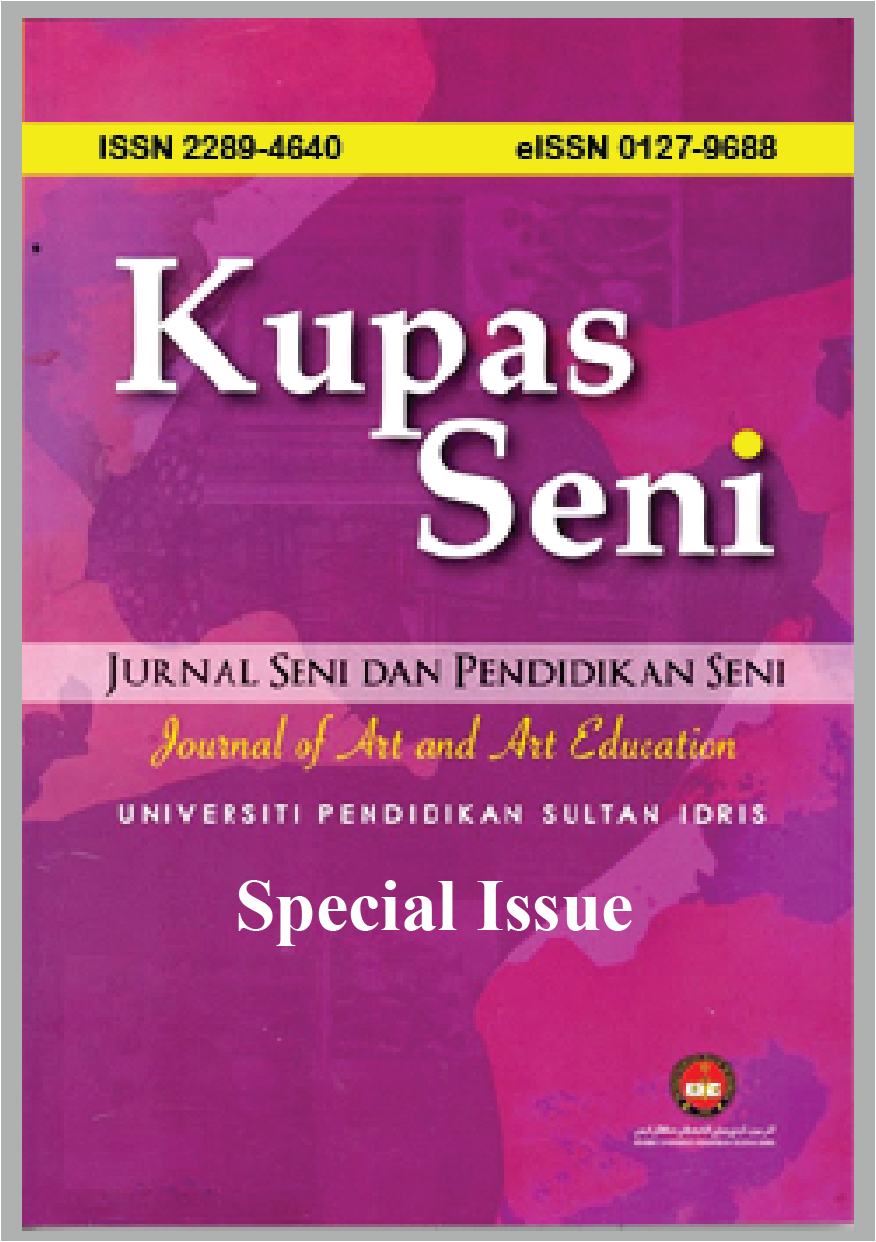Improving drawing skills among year 6 SK Sri Layang visual arts students by using led trace method
Meningkatkan kemahiran melukis dalam kalangan murid seni visual tahun 6 Sk Sri Layang menggunakan kaedah surih led
DOI:
https://doi.org/10.37134/kupasseni.vol10.sp.3.2022Keywords:
digital trace, drawing skillsAbstract
This study was conducted to examine the effectiveness of the application of the method of "LED Trace" to improve drawing skills among students of Visual Arts subjects. This study was conducted among students of class 6 Excellent SK Sri Layang, Genting Highlands. A total of 23 students were involved to help researchers to obtain data qualitatively and quantitatively by using several types of instruments, namely pre -test, post -test, analysis of assignment documents and questionnaires. Data analysis was done by using descriptive analysis method to describe the data obtained. The findings of the study showed that there was an improvement in student achievement after the application of the "LED Trace" method was introduced. The implementation of this method also involves group activities (peer guidance, seen to also help students to improve their skills. The use of "LED Trace" method as a new intervention explored in an effort to improve the development of skills and mastery of students in the subject of Visual Arts specifically.
Downloads
References
Abdul Shukor Hashim. (1985). Potensi Seni Kanak – kanak. Kuala Lumpur Dewan Bahasa dan Pustaka.
Ahmad Faizul, Roslaili Anuar (2015). Adaptasi Teori Pembangunan Kreatif dalam Membangun Kreativiti dalam Kalangan Pelajar Tahun 1, KUPAS SENI: Jurnal Seni dan Pendidikan Seni: Vol 3 (2015): KUPAS SENI: Jurnal Seni dan Pendidikan Seni https://ejournal.upsi.edu.my/index.php/JSPS/article/view/2269
Brown, H. D. (2000). Principles of language learning and teaching (Vol. 4). New York: Longman.
Cohen, E. J., Bravi, R., & Minciacchi, D. (2021). Assessing the Development of Fine Motor Control in Elementary School Children Using Drawing and Tracing Tasks. Perceptual and Motor Skills, 128(2), 605-624.
Gowen, E., & Miall, R. C. (2006). Eye–hand interactions in tracing and drawing tasks. Human movement science, 25(4-5), 568-585.
Merriam, S. B. (1998). Case Study Research In Education: A Qualitative approach San Francisco USA Jesey Bass.
Noradzimah Abdul Majid., Abdul Razak Nordin., & Normah Kamarodzan. (2015). Penjanaan idea kreatif lukisan kanak-kanak menerusi kaedah imitasi [Creative idea generation in child painting through imitation method]. Jurnal Penyelidikan Dedikasi, 9, 124-136.
Norjietta Julita Taisin. (2018). Aktiviti melukis meningkatkan keyakinan diri dalam kalangan kanak-kanak. Jurnal Pendidikan Awal Kanak-Kanak, 7, 19-29. https://ejournal.upsi.edu.my/journal/JPAK
Pusat Perkembangan Kokurikulum. (2000). Sukatan Pelajaran Pendidikan Seni Visual, Kuala Lumpur: DBP.
Rofidah Musa., Muhamad Firdaus Ramli., Norkhaizatul Erma Mohd Khairuddin., & Zainuddin Abindinhazir. (2019). Eksplorasi lakaran bertema kenderaan serta kesan terhadap kreativiti kanak-kanak. KUPAS SENI, 7, 72-80.
Taylor, C. W. (1985). Cultivating Multiple Creative Talents in Student. Journal for the Education of the Gifted. Dimuat turun pada 10 Ogos, 2021 dari https://journals.sagepub.com
Wang, Z., Qiu, S., Feng, N., Rushmeier, H., McMillan, L., & Dorsey, J. (2021). Tracing versus freehand for evaluating computer-generated drawings. ACM Transactions on Graphics (TOG), 40(4), 1-12.





